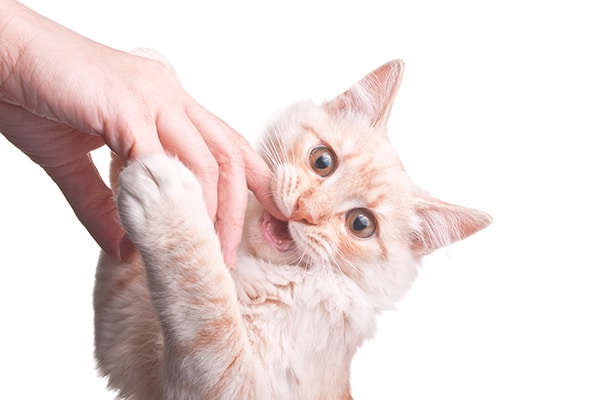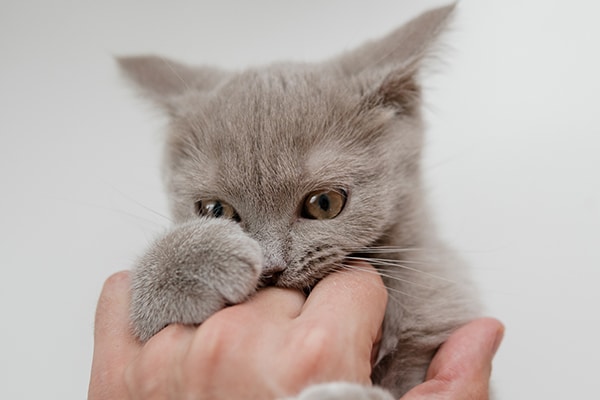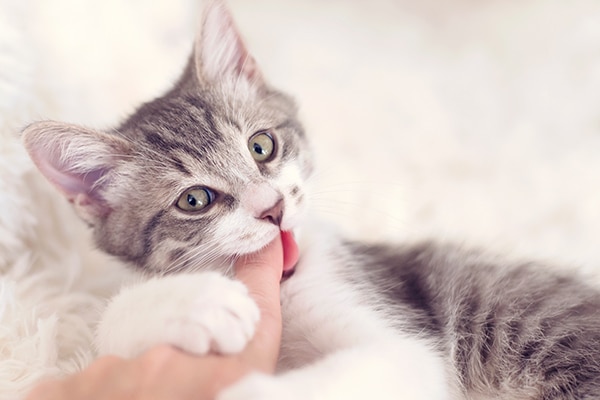Cat enthusiasts are probably the most passionate demographic around. We love our cats! We wear our love, we record it, we photograph it and we share our love, wholeheartedly. While we love our cats and want our cats to love us back, sometimes we get a little too zealous in demonstrating said love to our cats. Yes, we want to cuddle and stroke them nonstop, and very often they enjoy the attention — up to a point! Cat love bites are the result of our demonstrative nature run amok. Anyone who has lived with a cat probably has a story or two about cat love bites. Let’s find out how to identify cat love bites versus real cat bites and what to do when cat love bites happen.
Cat love bites and being overstimulated

What are cat love bites and why do they happen? Remember: Don’t teach your cat that human fingers are toys! Photography ©g_lutsenko | iStock / Getty Images Plus.
Cat sounds can only provide insight into our cats’ emotions to a point. So, we rely on cat body language to figure out how cats feel. Ears back, low growl, thumping tail says, “Stay away from me right now.” A cat who is cornered and agitated could lash out and attack the perceived threat. Watching for escalating aggressive signals from your cat can thwart real cat bites. Real cat bites that result in puncture wounds should be addressed right away.
However, there are times when you and your cat are in the groove. You’re giving him a nice ear rub, and he’s looking at you with soft eyes, giving you that cat slow blink kiss. He might even start kneading your leg. The feeling of mutual admiration is pulsing through the air. You start rubbing his shoulders, he seems to really like that area caressed. So, you increase the pressure and lean in a little more to ramp up that purr. Then, seemingly without warning, he bites down on your hand as you’re petting him. The pain probably takes hold of you before you can realize what just happened. Cat loves bites strike again!
According to Jackson Galaxy, cat behaviorist and author, cat love bites mean your cat is over-stimulated. More precisely, Galaxy tells the Sydney Morning Herald, “It’s called petting-induced overstimulation. The hair follicle receptors in a cat can only take so much petting before it hurts.”
Cat love bites can be a behavioral holdover from kitten days

Cat love bites are actually a kitten-like cat behavior. Photography ©VasilevKirill | iStock / Getty Images Plus.
My Himalayan mix, named Slayer, will out of the blue come over and bite my arm — it’s more like a nip. Whether I’m on the couch or in bed, he hops up and makes this random gesture. Then he’ll plop down and expose his belly. This ritual ends with me giving him a few strokes. But not too many!
So, what’s this about? Dr. Karen Becker tells Huffington Post that it’s reminiscent of the ways cats and kittens playfully interact with each other. It’s another form of cat love bites, but it’s not a result of too much stimulation. It’s your cat just being playful and using his nonverbal communication skills to let you know he’d like some attention, now, please.
Cat love bites and play aggression in cats
Most kittens play rough. Youngsters’ play is not only a form of social bonding, it’s also preparing the litter for adulthood. Bouts of mock stalking and hunting give way to pouncing and biting. Cat love bites can occur when your kitten is playing aggressively with you, especially if your kitten doesn’t have another feline playmate.
Again, you can tell the difference between aggressive playtime and real aggression in cats by paying attention to your kitty. If he’s not growling or hissing, his excitement (not agitation), is escalating. It’s important to remember that his play drive is connected to prey drive (which historically ends with a “kill”). Dr. Jean Hofve, DVM, holistic veterinarian warns on Jackson Galaxy’s blog that playing rough with your kitten can directly cause unwanted aggression toward you when he’s an adult. Cat loves bites from kittens might be funny. Adult cat love bites might cause swelling and infection.
If you’ve inadvertently created a cat who gets a bit too mouthy with cat love bites during play, you can change that behavior. Don’t play with your cat using your hands. Instead, use a toy with a string or wand. Teach your cat to fetch. Try clicker training your cat.
What to do after a cat love bite
In his interview with the Sydney Morning Herald, Galaxy recommends watching for signs of agitation while you’re petting your cat. If his pupils start dilating, his ears pin back and his tail starts wagging, stop caressing your cat. It’s really that simple. If you don’t stop before those cat love bites happen, definitely stop as soon as you are bitten.
Then let your cat establish what he wants to do next. Sometimes, cats make a mad dash out of there. Sometimes, they want to still be near you, they just don’t want you petting them any longer. Respect your cat’s boundaries and if he stays next to you, don’t keep touching him.
The bottom line on cat love bites
Cats show their affection in a myriad of subtle ways, so always be receptive to what he’s telling you. Seemingly innocuous actions like cheek rubs, headbutting and licking are actually letting you know they love you! Whether he’s hanging around and purring or kneading your extremities raw and chirping, it’s all about the love.
So, whether they’re giving you little cat love bites out of follicle frustration or out of kitty cat playfulness, our cats are always letting us know how they feel. It’s up to us to pay attention.
Thumbnail: Photography ©BubblegirlPhoto | iStock / Getty Images Plus.
This piece was originally published on February 7, 2018.
Tell us: What prompts your cat to give you those cat love bites and how do you respond to cat love bites?
About the author
Denise LeBeau is a writer, editor and photographer with almost 20 years of experience of creating content for animal-related issues, endeavors and events. She worked at Best Friends Animal Society for 12 years where she had two columns in the Best Friends Magazine, and held multiple content creation roles including web managing editor and outreach campaign editor. Denise has been an ongoing contributor to Catster since 2014, writing for the magazine and website. The self-professed poet laureate of the pet set is currently the manager of development for an animal welfare agency, where she works with a team to create content across media platforms. She lives in Hampton Bays with her two rescue Siamese mixes – Flipper and Slayer, and her LBD (little brown dog), Zephyrella.
